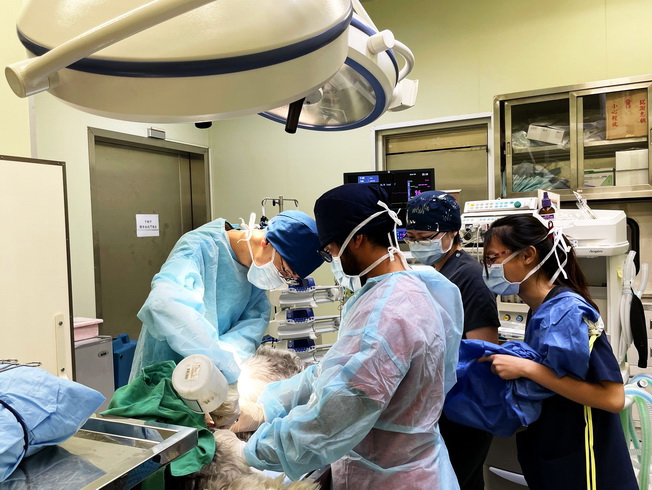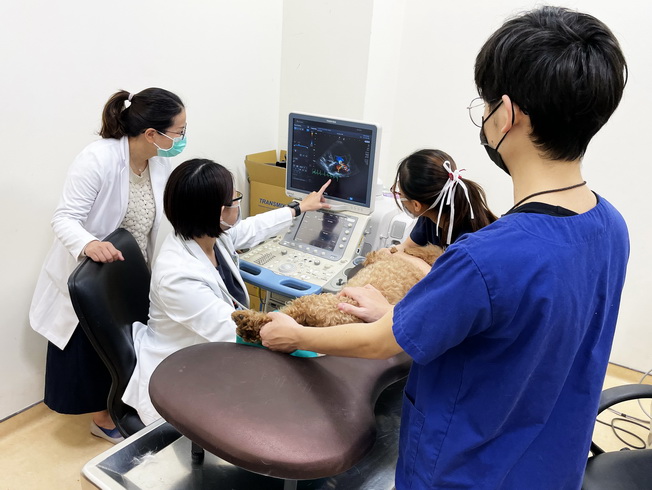| |
 |
News |
 |
Browsing: 1740 times

|
Date:2021-04-05
Bracket:2021 Feature
Department:ncyu
|
 NCYU Department of Veterinary Medicine Guarding the Health of Animals in Yunlin-Chiayi-Tainan Region
NCYU Department of Veterinary Medicine Guarding the Health of Animals in Yunlin-Chiayi-Tainan Region
To achieve standardized domestic veterinary education system, align with international standards of veterinarian education, and connect Taiwan’s veterinarian education with the global system, NCYU is dedicated to to facilitating education and academic research in veterinary medicine in conjunction with the national veterinary education reform plan. The College of Veterinary Medicine was founded on the Sinmin campus on Auguest 1st, 2016. It includes the bachelor’s program in veterinary medicine, master’s program in veterinary medicine, master’s program in clinical veterinary medicine, and in-service master’s program in veterinary medicine. It also includes affiliated units such as the Veterinary Teaching Hospital and Yunlin-Chiayi-Tainan Animal Disease Diagnostic Center. By nurturing outstanding clinical veterinarians and professionals in veterinary science and technology, the college is committed to basic veterinary medicine, animal disease diagnosis and treatment, epidemic monitoring and research, and animal disease prevention and control, with the welfare of both animals and humans as its ultimate goal. As the Yunlin-Chiayi-Tainan region is a hub for livestock husbandry in Taiwan, where economic animals are raised, it is important to strengthen research on the prevention, diagnosis and control of major animal diseases, with a special focus on the disease rapid diagnosis and zoonotic diseases from a public health perspective. It is expected to contribute to the development of Taiwan’s veterinary science in the future.
Industry, Government and Academia Work Together to Eradicate African Swine Fever and Ensure Health of Pigs in Taiwan
The NCYU College of Veterinary Medicine and the NCYU Alumni Association of Veterinary Medicine have been co-organizing the Swine Disease Conference in Taiwan on an annual basis. By bringing together professionals in the industry, government, and academia to share and exchange ideas on the epidemic trends of significant swine diseases in Taiwan, policies on African swine fever prevention, and biosecurity practices worldwide, it is an important annual event for the domestic pig farming industry, and will mark its 7th edition this year. In conjunction with the national epidemic prevention policy, the college plays a pivotal role in the diagnosis, prevention and control of animal diseases in the Yunlin-Chiayi-Tainan region to fulfill the social responsibility as a university with a spirit of service. With efforts on all sides, Taiwan was officially acknowledged as a foot-and-mouth disease-free area by the World Organization for Animal Health (OIE) in 2020, which bore witness to the dedication of the university and the government in protecting the health of Taiwan’s pigs. The NCYU Yunlin-Chiayi-Tainan Animal Disease Diagnostic Center has been founded for a decade since 2010. The number of pigs raised in the Yunlin-Chiayi-Tainan region accounts for 45% of the country’s total production, making it a major hub for pig farming. Its excellent achievements in disease prevention and control has been well received by the animal husbandry in the Yunlin-Chiayi-Tainan region. It also provides a wide spectrum of internship options for teachers and students of the department. Under the guidance of professional teachers, the students are engaged in on-site disease diagnosis, treatment and identification for animals, which allows students to have practical experience during college, put professional knowledge into practice through on-site clinical diagnosis and treatment, so as to become down-to-earth practitioners.
Birthrates of Dogs and Cats to Surpass Human Birthrates: Veterinary Medicine a Forward-Looking Science
According to statistics from the Ministry of the Interior in 2021, there are currently 2.95 million children under the age of 14. The number of dogs and cats in the country has exceeded 2.5 million, among which 2.3 million are pet dogs and cats based on the statistics of the Council of Agriculture in 2019. In other words, the birthrates of dogs and cats are growing faster than human birthrates. The number of dogs and cats in Taiwan is likely to exceed the number of children in 2021. The average lifespan of pets has increased in recent years, due to advancement in veterinary care and the public’s concept of pet keeping. The model, prevention and related studies mainly focus on aging and chronic disease control. The owners are attentive to the quality of the pets’ quality of life, hoping to reduce medical risks, and improve the animal welfare and dignity, etc. All these are testament to Taiwan’s remarkable potential in veterinary science. “Animal Imaging Center,” “Animal Blood Bank” and “Department of Traditional Chinese Veterinary Medicine and Rehabilitation Medicine” were established under the affiliated Veterinary Teaching Hospital in recent years. In addition to providing a teaching clinic, the teachers publish case reports on campus, at home and abroad on a regular basis, and submit papers to international journals. The young students can benefit from the rich clinical experience of the senior attending veterinarians in conducting critical and complex cases, literature review, and clinical discussion and reports. The goal is to train students to become veterinarians, who are conscientious and integral, able to think and solve problems, and advance with the times to contribute to the development of veterinary medicine.
NCYU Department of Veterinary Medicine Students Show Outstanding Performance: Passing Rate for Veterinarian Qualifications Exceeds National Average
Thanks to professional guidance and diverse practical experiences, the students of the NCYU Department of Veterinary Medicine, despite its relatively small scale compared with other veterinary departments in Taiwan, demonstrate great commitment and perseverance in achieving remarkable results in license examinations. They are expected to enjoy a promising future whether in pursuing further studies or seeking employment. There has been a high rate of the fresh graduates who have passed the Senior and Junior Examinations for Professional and Technical Personnel: Veterinary Personnel (to be legally qualified as a veterinarian). Also noteworthy is that the passing rate of recent graduates of the academic year 2020-2021 in the exam was as high as 87%, far surpassing the national average of 58.92%. Passing the exam is the basic criterion to conduct diagnosis, treatment, inspection and prescription as a veterinarian. In the past 5 years, the average passing rate of the students in this department, dedicated to nurturing outstanding veterinary professionals for the country, is around 64% to 87%, which is higher than the national average passing rate.
Providing Veterinarian Training Aligning with International Standards in Conjunction with New Southbound Policy
The Veterinary Teaching Hospital, affiliated to the College of Veterinary Medicine, serves as the animal evacuation hospital in the Yunlin-Chiayi-Tainan region. The hospital is divided into 8 departments according to the medical system. A number of teaching research and training projects have been formulated with a view to improving teaching, research, and internship in the field of veterinary medicine and advancing animal medicine. It has medical intern students of the Department of Veterinary Medicine, resident veterinarians at all levels, specialist veterinarians, veterinary administrative assistants, etc. In conjunction with talent exchange plan as part of the New Southbound Policy, the students from the School of Life Sciences and Chemical Technology, Ngee Ann Polytechnic, Singapore, has been paying visits to the NCYU Veterinary Teaching Hospital for internships since 2018, which helps facilitate the internationalization of the college.
The first domestic case of lumpy skin dis
|



|
 |

|
 |
|
 |
 |
|


 ][
][